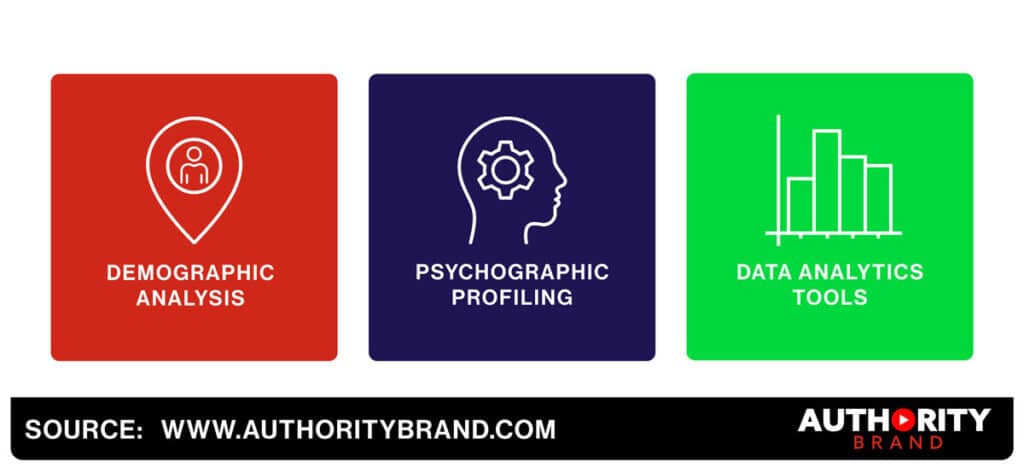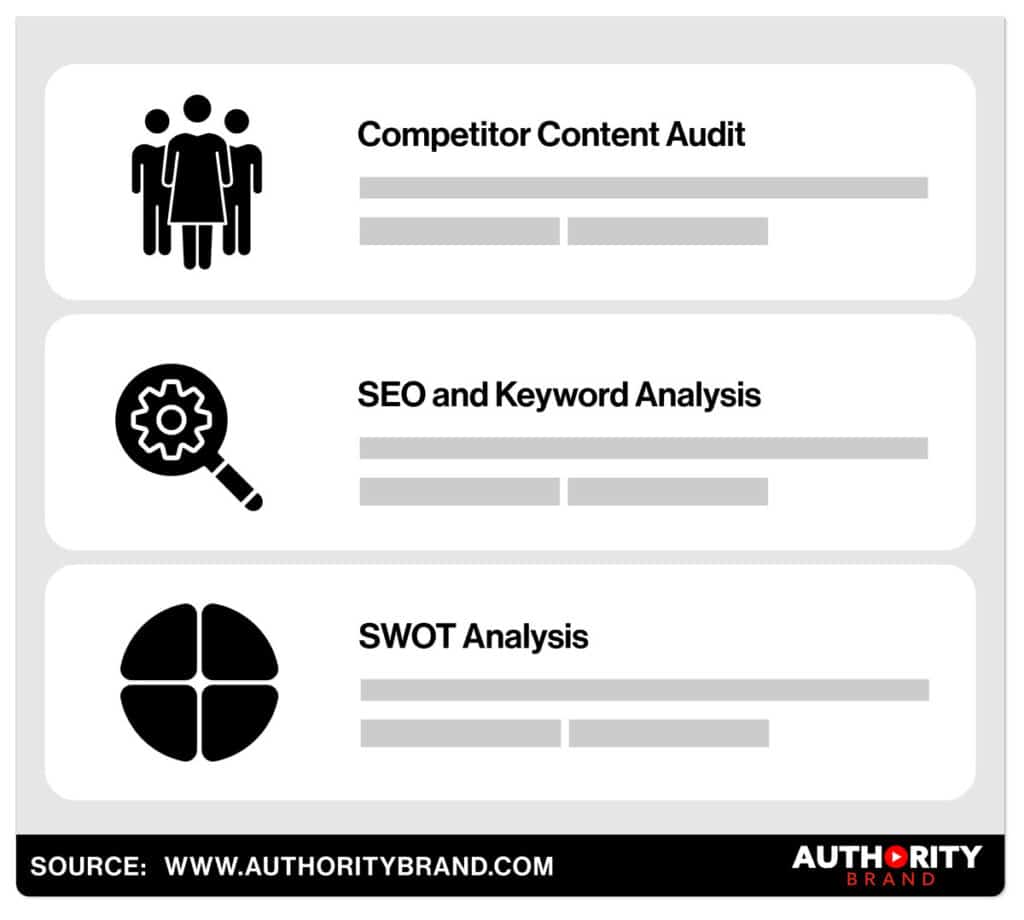Content Marketing Research
Content Marketing Research:
Unveiling Key Strategies for Effective Campaigns

In the world of content marketing, research is the key to success. With so much online information, it’s essential to understand your audience’s needs, preferences, and behaviors to create engaging and compelling content. Research is necessary to resonate with your audience and achieve marketing goals effectively.
Content marketing research utilizes data to create valuable content that resonates with the audience, fosters relationships, and drives action. By understanding your audience’s pain points, interests, and desires, you can craft content that speaks directly to them and motivates them to take the desired action. So, let research be your compass as you navigate the ever-changing content marketing landscape.
Welcome to Authority Brand! We are passionate about helping your business thrive. Our ANSWER framework and direct response principles are designed to attract and convert ideal clients into brand ambassadors. Our social media services are tailored to fit your company’s personality, needs, and goals. We aim to enhance your online presence by engaging and converting your followers into loyal customers.
So, if you are ready to take your brand’s social media presence to new heights, join us! We’ll help you create a buzz, build a community, and turn your followers into raving fans. Let’s make your brand the talk of the town!
1. The Importance of Content Marketing
Why Research is Crucial in Content Marketing

To create compelling content marketing, conducting thorough research is crucial. It acts as a guide for campaigns and helps marketers understand audience preferences and market trends. Marketers can gain insights into their target audience’s interests by analyzing data, using social listening tools, and conducting trend analysis.
It’s about knowing what content is popular and understanding why it resonates with consumers. This involves identifying the factors that impact consumer behavior and creating content that addresses their needs, goals, and pain points.
Research empowers data-driven content creation. It helps marketers determine the most effective content formats, subjects, and distribution methods to attract viewers, encourage interaction, and drive desired actions.
Data-driven content creation is a deliberate process that relies on understanding what works and what doesn’t. The objective is to produce content that personally engages the audience, speaks directly to them, and cultivates strong relationships between businesses and customers.
2. Conducting Effective Content Marketing Research
Identifying Your Audience and Their Needs
Audience research is a crucial aspect of any marketing strategy. There are several methods and tools available to conduct audience research effectively.
One of the fundamental methods of audience research is demographic analysis. Understanding your target audience’s age, gender, location, and other characteristics is essential to audience research. Demographic analysis can provide this information.
Psychographic profiling is another method that can provide in-depth insights into your target audience’s motivations, actions, passions, and problems. Social media monitoring, interviews, and surveys can be used to conduct psychographic profiling.
Data analytics tools such as Google Analytics, social media insights, or customer relationship management (CRM) systems can provide quantitative information on audience interactions and behaviors.
You can monitor social media discussions using social listening platforms to understand the attitudes, fads, and conversations surrounding your brand or industry.
Interacting with your audience and learning about their preferences and insights can be achieved through surveys or feedback forms.
Finally, creating comprehensive buyer personas based on gathered data can help you better understand and humanize your audience segments.
Utilizing these methods and tools allows you to conduct effective audience research and develop a marketing strategy that resonates with your target audience.

Analyzing Competitors and Industry Trends
Here are some techniques that can help you evaluate your content strategy compared to your competitors.
The first technique is the Competitor Content Audit. This involves analyzing your competitors’ content strategies, formats, frequency, and engagement metrics to identify opportunities and gaps.
The second technique is SEO and Keyword Analysis. You can improve your content strategy by determining what keywords and subjects your competitors focus on.
The SWOT Analysis technique involves considering your competitors’ strengths, weaknesses, opportunities, and threats to enhance your strategy.

To keep up with changing trends in content, you can use industry publications and reports to stay up-to-date with new trends. You can use content curation tools like BuzzSumo and Feedly to discover popular topics and well-liked content in your niche.
Finally, networking and thought leadership can be valuable. Participating in debates, forums, and networking events can help you share ideas and stay informed about changing business environments.
3. Leveraging Research in Content Creation
From Research to Strategy – Crafting Impactful Content
Converting research findings into content plans involves several key steps. First, it’s essential to customize content themes by determining subjects and themes that appeal to your audience using audience insights. This involves identifying problems, offering remedies, and matching audience demands with content.
Next, research can help identify the best channels (social media, email, etc.) and content formats (blogs, videos, infographics, etc.) for connecting with and interacting with the target audience. This ensures that the content is delivered in the most effective way possible.
For optimal effect and audience engagement, data-driven insights can direct the frequency and timing of content publication. This means that the constant cadence and timing should be carefully considered.
Creating creative briefs incorporating research findings with innovative concepts is essential to ensure that content is both inventive and data-driven. These data-informed creative briefs guarantee that the content is both creative and practical.
Finally, continuously assessing audience feedback and performance metrics is essential to improve and optimize content strategies without sacrificing creativity. This iterative approach allows for ongoing improvement and optimization of constant strategies.

SEO and Content Marketing Research

Conducting SEO research when creating content to ensure high search engine rankings is crucial. It’s essential to research relevant and high-ranking keywords using tools like SEMrush, Ahrefs, and Google Keyword Planner to improve your content’s visibility.
To optimize your content for SEO, you should naturally incorporate keywords into your written material while emphasizing readability, relevancy, and audience value. Additionally, you should improve the SEO performance of your images, headers, and meta tags.
It’s also essential to align your content with user intent to ensure it effectively answers your audience’s questions or meets their needs. This is known as user intent alignment.
4. Measuring the Success of Your Content
Analytics and Performance Measurement

There are several tools available to monitor the performance of your content. Google Analytics provides extensive information on metrics related to content engagement, user behavior, and website traffic. Social media insights can be obtained from websites like Facebook Insights, Twitter Analytics, and LinkedIn Analytics, which track post reach, engagement, and audience demographics. Content Management Systems (CMS) often come with integrated analytics to monitor the effectiveness of the content on the platform. Email service providers also provide data on subscriber behavior, open rates, and click-through rates.
To effectively evaluate your content, there are several key performance indicators (KPIs) that you can use. Engagement metrics like likes, shares, comments, and time spent on content can be used to measure audience interest and interaction. Conversion rates can be used to monitor the number of users who complete desired actions, such as purchasing items, subscribing to newsletters, or completing forms, following their interaction with content. Traffic sources can be used to determine the audience’s origins (social media, organic search, and referrals) to assess the efficacy of various media. Return on Investment (ROI) measures financial gains over expenditures in producing and disseminating content. The percentage of visitors to a web page who leave without interacting further is known as the “bounce rate,” which provides information about the engagement and relevancy of the content.
Iterative analysis and optimization can help improve the effectiveness of your content. A/B testing can compare different versions of content and determine which resonates best with the audience. Content gap analysis can determine which subjects or formats are most effective and which require further research or development. Periodic audits can be used to regularly evaluate and improve content strategies based on audience preferences and performance insights.
Conclusion: The Research-Driven Path to Audience Engagement and Marketing Success
Effective content marketing strategies rely on research to gain insights into target markets, trends, and competition. Creating purposeful content that resonates with your audience and motivates desired actions can be achieved by leveraging senses. A research-driven approach supports creativity and data-driven decision-making, ensuring content is produced in response to audience preferences, trends, and competition. By using rigorous research methodologies, marketers can create impactful content that contributes to the success of their content marketing initiatives.
Transform Your Ad Campaigns
Discover the fastest and easiest way to effortlessly triple your ad profits using Trust Scaling.
